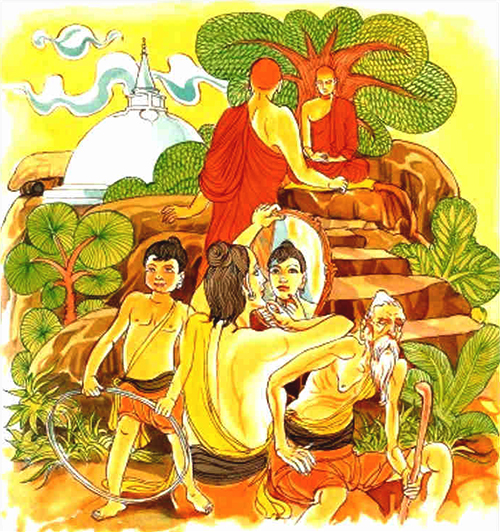Verse 157: If one knows that one is dear to oneself, one should protect oneself well. During any of the three watches (of life) the wise man should be on guard (against evil).
If one knows that one is dear to oneself, one should protect oneself well. During any of the three watches (of life) the wise man should be on guard (against evil).
- yamam: A night is divided into three watches. According to the Commentary, the watches in this context are the three stages in Man’s life, viz., childhood, youth and old age.
The Story of Bodhirajakumara
While residing at the Bhesakala wood, the Buddha uttered Verse (157) of this book, with reference to Prince Bodhi (Bodhirajakumara).
Once, Prince Bodhi built a magnificent palace for himself. When the palace was finished he invited the Buddha for alms-food. For this special occasion, he had the building decorated and perfumed with four kinds of scents and incense. Also, a long length of cloth was spread on the floor, starting from the threshold to the interior of the room. Then, because he had no children, the prince made a solemn asseveration that if he were to have any children the Buddha should step on the cloth. When the Buddha came, Prince Bodhi respectfully requested the Buddha three times to enter the room. But the Buddha, instead of moving, only looked at Ananda. Ananda understood him and so asked Prince Bodhi to remove the cloth from the door-step. Then only, the Buddha entered the palace. The prince then offered delicious and choice food to the Buddha. After the meal, the prince asked the Buddha why he did not step on the cloth. The Buddha in turn asked the prince whether he had not spread the cloth making a solemn asseveration that if he were to be blessed with a child, the Buddha would step on it; and the prince replied in the affirmative. To him, the Buddha said that he and his wife were not going to have any children because of their past evil deeds. The Buddha then related their past story.
In one of their past existences, the prince and his wife were the sole survivors of a shipwreck. They were stranded on a deserted island, and there they lived by eating birds’ eggs, fledglings and birds, without any feeling of remorse at any time. For that evil deed, they would not be blessed with any children. If they had felt even a slight remorse for their deed at any stage of their lives, they could have a child or two in this existence. Then turning to the prince, the Buddha said, “One who loves himself should guard himself in all stages of life, or at least, during one stage in his life.”
Then the Buddha spoke in verse as follows:
Verse 157: If one knows that one is dear to oneself, one should protect oneself well. During any of the three watches (of life) the wise man should be on guard (against evil).
At the end of the discourse, Bodhirajakumara attained Sotapatti Fruition.
Dhammapada Verse 157
Bodhirajakumara Vatthu
Attanance piyam janna
rakkheyya nam surakkhitam
tinnam annataram yamam1
patijaggeyya pandito.
Source: Tipitaka








Jayesh Thakkar
Take care. Good night from here Jen.
pswarnakumar
good morning dearest jendhamuni…..plz take care of corona